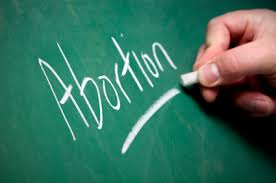记忆方法
abortion "偶不生"-----流产,堕胎的
英语词源
- abortion (n.)
- 1540s, originally of both deliberate and unintended miscarriages; from Latin abortionem (nominative abortio) "miscarriage; abortion," noun of action from past participle stem of aboriri "to miscarry" (see abortive).
Earlier noun in English was simple abort (early 15c.) "miscarriage." In 19c. some effort was made to distinguish abortion "expulsion of the fetus between 6 weeks and 6 months" from miscarriage (the same within 6 weeks of conception) and premature labor (delivery after 6 months but before due time). The deliberate miscarriage was criminal abortion. This broke down late 19c. as abortion came to be used principally for intentional miscarriages, probably via phrases such as procure an abortion.
Foeticide (n.) appears 1823 as a forensic medical term for deliberate premature fatal expulsion of the fetus; also compare prolicide. Another 19c. medical term for it was embryoctony, from Latinized form of Greek kteinein "to destroy." Abortion was a taboo word for much of early 20c., disguised in print as criminal operation (U.S.) or illegal operation (U.K.), and replaced by miscarriage in film versions of novels.
权威例句
- 1. There are many people who still find the act of abortion abhorrent.
- 仍有很多人对堕胎行为表示厌恶。
- 2. Sometimes the original abortion was done so badly that the uterus prolapsed.
- 有时第一次流产手术做得太糟糕,会导致子宫下垂。
- 3. He and his wife both strongly support abortion rights.
- 他和妻子都强烈支持堕胎权。
- 4. They said they were going to stack the court with anti-abortion judges.
- 他们说将会往法院中安排一些反对堕胎的法官。
- 5. Her party opposes abortion, except in cases of rape or incest.
- 她的党派反对堕胎,但强奸或乱伦引起的怀孕除外。
